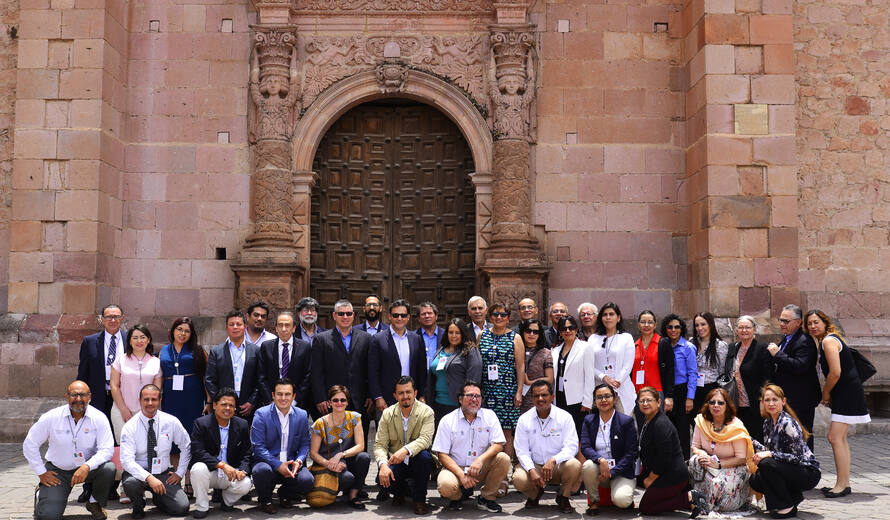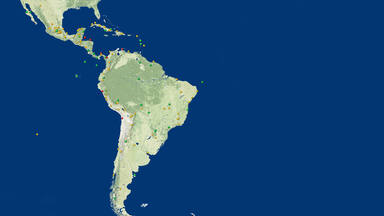States Parties of Mexico and Central America adopt in Zacatecas “Action Plan for World Heritage” for next 5 years
Following the regional strategy approved by the World Heritage Committee in Decision 38 COM 10B.4 (Doha, 2014), and contained in the regional Action Plan for World Heritage in Latin America and the Caribbean (PARALC), 2014-2024, a sub-regional meeting with the participation of Mexico and the countries of Central America was held in Zacatecas, Mexico. The objectives of the meeting were to reflect upon, analyze and debate the current challenges and opportunities in the implementation of the World Heritage Convention within the seven countries comprising the sub-region.
The result of this productive meeting was the Action Plan for World Heritage in Mexico and Central America (PAMAC), 2018-2023 adopted by the national focal points for World Heritage representing the seven countries of the sub-region. The national representatives sealed their commitment in a framework of sub-regional cooperation through in the signing of an Act of Conclusions and Commitments to guarantee the successful implementation of the Plan.
The PAMAC 2018-2023 will serve as a key reference to successfully carry out the priority actions defined by the States Parties to reach the six Expected Results. These results respond to the six objectives agreed upon, and which correspond to the following topics:
- Improved implementation of the Convention through effective national policies and actions of diffusion and training
- Identification of properties in the sub-region of categories of heritage under-represented on the World Heritage List
- Management of World Heritage properties in an inter-institutional and participative manner
- Effective integration of sustainable tourism policies and strategies
- Development and application of Environmental and Heritage Impact Assessments
- Management of disaster risk prevention
The Action Plan contains a Capacity-Building Strategy (EFCAMAC) and the Pilot Projects Programme (PPPMAC) as key tools to work towards the objectives and guide the application of the Plan. These tools were also analyzed and adopted by the participating countries. During the implementation of the Capacity-Building Strategy, the countries will receive important support from the Regional Institute for World Heritage in Zacatecas, Category 2 Centre under the auspices of UNESCO.
Following the adoption of the sub-regional Action Plans for South America and the Caribbean, the PAMAC 2018-2023 is the last link in the regional strategy to improve the implementation of the Convention in the LAC Region.
The organization of the event was an initiative of the UNESCO World Heritage Centre, the Direction of World Heritage of the Secretariat of Culture in Mexico and the Regional Institute for World Heritage in Zacatecas, and took place from the 23 to 25 of April in the Government Palace of the Historical Centre of Zacatecas, property inscribed on the UNESCO World Heritage List in 1993.
Decisions (1)
The World Heritage Committee,
- Having examined document WHC-14/38.COM/10B,
- Recalling Decision 37COM 10A adopted at the 37th session (Phnom Penh, 2013),
- Congratulates the States Parties of Latin America and the Caribbean region for their efforts to continue follow-up actions to the exercise of the second cycle of the Periodic Reporting exercise for Latin America and the Caribbean, and adopts the 2014-2024 regional Action Plan;
- Notes with appreciation the support of the Government of Brazil and the National Institute for Historic and Artistic Heritage (IPHAN) in organizing the regional meeting “Towards defining an Action Plan for World Heritage in Latin America and the Caribbean”, in close cooperation with the World Heritage Centre, UNESCO Office in Brasilia, the Advisory Bodies and the category 2 centres of the Region;
- EncouragesStates Parties and all other World Heritage partners and stakeholders in Latin America and the Caribbean to cooperate actively to ensure the implementation of the Action Plan, which reflects regional priorities to include, but not limited to, education and public awareness, disaster risk management, integrated heritage management, and sustainable tourism in World Heritage properties;
- Calls upon the States Parties from the Region to support the implementation of the 2014-2024 Action Plan and also encourages them to provide technical and financial resources at national level for its implementation;
- Further encourages States Parties to continue working, in close cooperation with the World Heritage Centre, Advisory Bodies and the Region’s category 2 centres, to develop sub-regional action plans, based on the Action Plan and taking into consideration and building upon the achievements of the previous plan with a focus on the specific needs of each sub-region;
- Acknowledges the progress made by the States Parties of Mexico and Brazil in effectively establishing the UNESCO category 2 centre for the World Heritage in Zacatecas, Mexico, as well as the UNESCO Lucio Costa category 2 centre of Rio de Janeiro, Brazil, and strongly encourages them to continue their efforts in cooperation with the World Heritage Centre, States Parties and Advisory Bodies to initiate a capacity-building programme for the management and conservation of World Heritage in the region;
- Also calls upon States Parties from other regions to support the efforts of the Latin American and the Caribbean Region in implementing the Action Plan, in the spirit of the international cooperation promoted by the World Heritage Convention;
- Reminds States Parties which have not already done so to submit their Retrospective Statements of Outstanding Universal Value by 1 February 2015 at the latest, as well as clarifications of boundaries by 1 December 2014 at the latest;
- Requests the World Heritage Centre to provide information on the progress made in the implementation of the regional Action Plan and sub-regional action plans at its 40th session in 2016.

